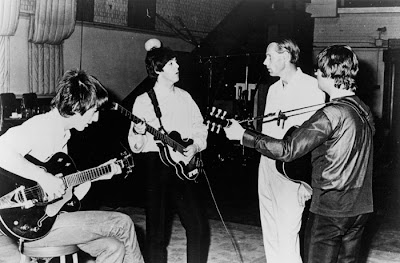A word of explanation might be overdue as we mosey on down this long and winding road. Generally we’ve divided the Beatles output into chapters
(there’ll be a page of links to all the CDs at some point) but as we’re going reverse chronologically now it’s going to get really weird.
We did the very last Beatles song
I Me Mine which is part of
Let It Be (aka chapter
11).
Huh?
Then we jumped straight into Chapter 12 (
Abbey Road). After that we should head back to chapter 11 to mop up the rest of
Let It Be (though missing out
Across The Universe for the time being). That's if I haven't changed my mind again and decided to do them alphabetically, numerically or sociologically.
Confused?
Like me you probably thought studying Beatles songs chronologically would be easy, right? You just grab all the albums in the order they were released and off you go.
Yes?
No.
Problems, problems
1) Up until
Revolver The Beatles released totally different albums with different track lists (and sometimes different mixes) in the UK and US.
2) Most Beatles singles, and some EP tracks didn’t appear on the albums that were released around the same time.
3)
Let It Be was released
after Abbey Road, even though almost all of it was recorded
before.
4)
Magical Mystery Tour was originally released as a 6 track EP but was bulked up with misc tracks for US release.
5) The
Yellow Submarine Soundtrack comprised one side of Beatles recordings and one side incidental music by
George Martin. In recent years the
Soundtrack album has been replaced by the
Songtrack album which is bulked up in a similar way to MMT.
We can work it out
Here’s how I make sense of it all.
1)
The UK albums are the ‘proper’ ones. Once the Beatles took off in the States there was a kind of gold rush between different companies who had licensed singles and Capitol had a the bright idea that by releasing shorter albums, they could release more albums and generate more money. None of this was done with Beatles approval and when they did get involved they made the US releases match the UK ones.
2)
I Me Mine (Let It Be) may have been the last song the Beatles ever recorded but it was already ‘in the can’ before
Abbey Road albeit in a film can rather than a decent studio recording. So
Abbey Road really
is the last Beatles album.
3) I’m including all the singles and B sides along with the albums they’re closest to chronologically. Each ‘chapter’ ends with the albums release date, but most singles fit easily into the time frame anyway.
4) 5)
Magical Mystery Tour (the US album) has 5 extra tracks but 3 of them are from the same period so the US album could be considered 'close to correct' (which is why the UK CD edition is now the same as the US). Yellow Submarine, on the other hand, comprises tracks from their previous 4 albums. Only 4 songs were previously unreleased (and 1 of those was a
Sgt Pepper reject). This was probably their most fragmented period but these two albums minus some tracks combined with a few singles make up one more unified chapter.
So my 12 chronological chapters are…
1 - Please Please Me
2 - With The Beatles
3 - A Long Tall Hard Day’s Night
4 - Beatles For Sale
5 - Help!
6 - Rubber Soul
7 - Revolver
8 - Sgt Pepper’s Lonely Hearts Club Band
9 - Magical Mystery Submarine
10 - The Beatles White Album
11 - Let It Be
12 - Abbey Road
Please Please Me and
With The Beatles are both done, so on we go with
Abbey Road.




























